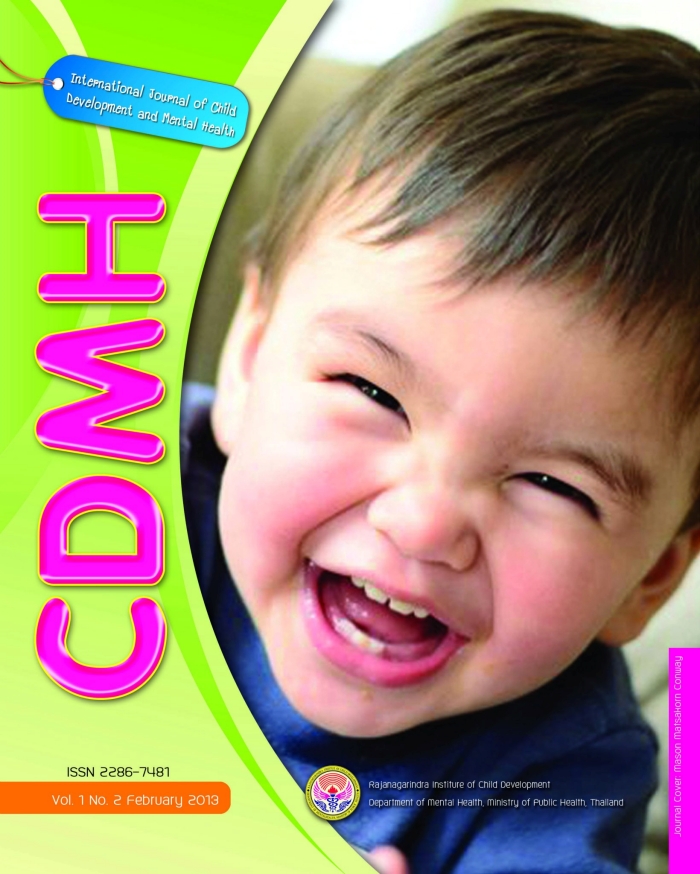The Study of Early Intervention for Children with Disabilities in the Thai-Lao Ethic Group
Main Article Content
Abstract
This study is in-depth research of the early intervention model for children with disabilities in the Thai-Lao ethnic group in Surin Province, Thailand and in Champasak Region, Lao People’s Democratic Republic. Factors of this early intervention model for children with disabilities in the Thai-Lao ethnic group were analyzed and an educational policy model of early intervention for children with disabilities, in accordance with the context of Thailand, was proposed. Study methodol ogy combi ned qual i tati ve and quantitative methods with ethnographic research, focus group, and statistical factor analysis. Results of the study revealed that there were four aspects in the intervention model for children with disabilities in the Thai-Lao ethnic group derived from ethnographic research as follows: 1) family aspect, 2) assistant from community, government organization and related units aspect, 3) early intervention aspect, and 4) media, facility and environmental aspect. This four-aspect guideline was administered by personnel of the Special Education Center. With the application of statistical factor analysis, results indicated that there were 10 factors in the early intervention model for children with disabilities in the Tai-Lao ethnic group as follows: 1) personnel or organization in early intervention for 19 items, 2) collaboration of related organizations networking for 13 items, 3) social rights for 13 items, 4) educational rights for 9 items, 5) participation for 14 items, 6) support in rights service received for 8 items, 7) support in educational service for 7 items , 8) coordination and transferable service for 7 items, 9) government service received for 3 items, 10) occupational rights for 3 items. All of these factors in the intervention model for children with disabilities in the Tai-Lao ethnic group were used in a focus group process. It revealed that the proposed policy model, measurement and project of the intervention for children with disabilities in the context of Thailand should consist of the following: 1) encouraging thorough good quality educational services for children with disabilities in five measurements and three prominent projects, 2) cooperation of educational management for children with disabilities in six measurements and three prominent projects, 3) intensively promoting social support for children with disabilities in five measurements and three prominent projects, 4) supporting educational requirements for children with disabilities in their need to study in five measurements and three prominent projects, 5) participation of concerned organizations for children with disabilities in four measurements and three prominent projects, 6) intensively promoting children with disabilities to attain the same service as normal people in five measurements and three prominent projects, 7) intensively promoting thorough valid service in education for children with disabilities in five measurements and three prominent projects, 8) supporting cooperation between organizations networking for children with disabilities in four measurements and three prominent projects, 9) supporting quality services from government organi zati ons i n three measurements and two prominent projects, 10) thoroughly supporting disabilities and disability caregivers with sustainable occupations in five measurements and three prominent projects. The results of the study in policy, measurements and projects directly relate to special education organizations to recognize the needs, and valid necessities of children with disabilities. The capacity of children with disabilities should be developed by coordinating local authorities and relating special and important need services to each disabled child. This should be provided by developing each organization unit to be in the home and the services coming from parents.
Article Details
The authors retain copyright and permit the journal the copyright of first publication
Articles, once having passed the review process and accepted for publication in the CDMH Journal, are copyrighted under the CDMH Journal, Department of Mental Health, Ministry of Public Health. Please be aware distribution of CDMH Journal content for commercial purposes without permission is expressly prohibited. However, distribution with intent to educate, advocate, or spread awareness within the general public and research communities is permitted and encouraged with the understanding that the CDMH Journal Editorial Board do not hold jurisdiction or liability for any accompanying comments, text, or information from third parties, either in favor for or against the original article’s assertions, conclusions, methodology, or content.


